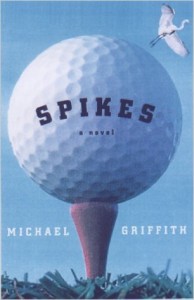Golf novel explores changes and choices under pressure
June 22, 2001
Sometimes I think there’s only one major difference between a young adult crisis and a mid-life crisis.
Those suffering a mid-life crisis seem to regret the choices they didn’t make as they lived through the first four or five decades.
Young adults, on the other hand, seem to regret the choices they made.
In either case, the possibility of redemption, of taking a different path, still beckons. Whether younger or older, each must decide how to react to what is now going on around them.
Changes and choices under pressure are underlying themes in a fine new addition to golf literature, Spikes, by Michael Griffith (Arcade Publishing; $24.95 SRP).
Brian Schwan, the protagonist in Spikes, is suffering a young adult crisis. At only twenty-six, and four years out of college, Schwan is floundering his way to oblivion on a professional golf tour that is itself on the wrong side of nothing special.
Schwan’s fellow mini-tour players call him Clutch. As he explains in this first-person narrative, the nickname is intentionally ironic, earned by his impressive record of snatching defeat from the jaws of victory in a few well-drawn incidents.
As the book begins, Schwan has just blown up his first round in yet another tournament, this time at the improbably named Ile de Paris Golf & Beach Club, near Charleston, South Carolina. The golf course, with its own scale model of the Eiffel Tower beckoning, is no island of respite from his troubles.
Schwan’s playing partner Jim “Bird” Soulsby, shot a 59, a cool 18 shots better than Schwan’s own miserable 77. His other buddy, Hatch, a rich kid whose talents come easily to him, is waiting near the scorer’s tent, eager to collect on their usual bet. Schwan thinks of his young wife, Rosa, who wants him to quit the tour, return home, and start a family.
To make matters worse, just as he throws his clubs into his car for the ride back to his god-awful motel, a local television reporter appears with her cameraman and thrusts her microphone into Schwan’s face. She mistakenly believes that he’s the one who shot 59, and asks for an interview.
Schwan makes a fateful decision. He does the interview.
Now, why would anyone do that? It’s insane. The tournament officials will not look kindly on the stunt, and could make things very difficult for him. On the other hand, maybe the readers are seeing the first sign that Schwan himself recognizes the need to make some big changes in his life, and he’s just chosen a unique way to start making them.
The story line jumps back and forth, from pre-interview to post-interview and back again. Schwan describes his youth, in which his father sought his own vindication in the golfing accomplishments of his son. His mother creates a family history that reflects her desires more than reality. His wife’s sense of purpose and drive to see her husband succeed in life is colored by her born-again Christianity and her mystical dream interpretations.
The difference is that Schwan keeps thinking his salvation lies in golf, while Rosa thinks his salvation lies is in coming home, starting a family, and using his accounting decree.
Along the way, Griffith treats the reader to a moodily funny portrait of America’s Southeast. For example, his portrait of the endless string of golf courses in the Carolinas, fueled by time-share sales to northern rubes, with Vegas-like billboards touting their raw charms, is dead-on.
The story of how Schwan met Rosa is a great short story by itself. It blends a charming romance with a satirical look at college golf, mixed in with a classic rendition of a uniquely American archetype, the college sports booster.
For much of his life, Schwan has been essentially passive. He let others dictate the terms under which he lives and strives for success. As the story moves on, Schwan begins to see a way out of the traps he’s set for himself by living that way. As the novel concludes, Schwan is moving toward taking active responsibility for what he does and how he does it.
Griffith wrote a good first novel. I hope he finds a way to write another golf story soon.


